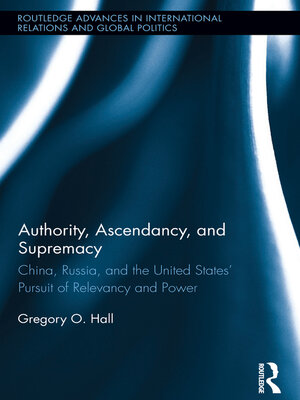Authority, Ascendancy, and Supremacy
ebook ∣ China, Russia, and the United States' Pursuit of Relevancy and Power · Routledge Advances in International Relations and Global Politics
By Gregory O. Hall

Sign up to save your library
With an OverDrive account, you can save your favorite libraries for at-a-glance information about availability. Find out more about OverDrive accounts.
Find this title in Libby, the library reading app by OverDrive.



Search for a digital library with this title
Title found at these libraries:
| Library Name | Distance |
|---|---|
| Loading... |
Authority, Ascendancy, and Supremacy examines the American, Chinese, and Russian (Big 3) competition for power and influence in the Post-Cold War Era. With the ascension of regional powers such as India, Iran, Brazil, and Turkey, the Big 3 dynamic is an evolving one, which cannot be ignored because of its effect to not only reshape regional security, but also control influence and power in world affairs.
How does one define a "global" or "regional" power in the Post-Cold War Era? How does the relationships among the Big 3 influence regional actors?
Gregory O. Hall utilizes country data from primary and secondary sources to reveal that since the early 1990s, competition for influence and power among the Big 3 has intensified and could result in armed confrontation among the major powers. He assesses the state of affairs in each country's economic, resource, military, social/demographic, and political spheres. In addition, events data, which focuses on international interactions, facilitates identifying trends in Big 3 interactions as well as their concerns and affairs with regional players. Opinion data, drawn from policy makers, scholarly interviews, and survey research data, identifies foreign policy interests among the Big 3, as well non-Big 3 foreign policy behaviors.
With its singular focus on American, Chinese, and Russian interactions, policy interests, and behaviors, Authority, Ascendancy, and Supremacy represents a significant contribution for understanding and managing Post-Cold War conflicts and promises to be an important book.







